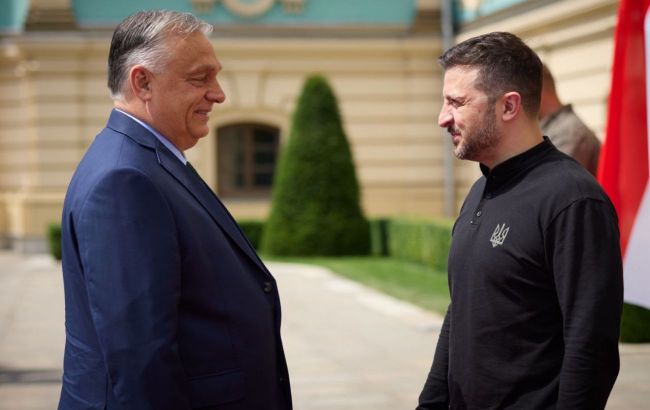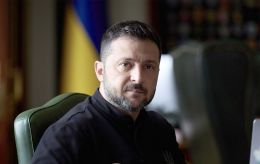Ice broken? Why Hungarian prime minister visits Ukraine
 Viktor Orbán, Volodymyr Zelenskyy (photo: Press Service of the Office of the President of Ukraine)
Viktor Orbán, Volodymyr Zelenskyy (photo: Press Service of the Office of the President of Ukraine)
On July 2nd, for the first time in many years, the Prime Minister of Hungary, Viktor Orbán, visited Ukraine. Read about the reasons behind this visit and its potential consequences in the material by RBC-Ukraine.
Contents
- Main messages from Orbán in Kyiv
- How power shifts in the EU benefit Ukraine's relations with Hungary
- Issue of Ukraine's Hungarian minority: The process continues
Main messages from Orbán in Kyiv
Hungarian Prime Minister Viktor Orbán visited Ukraine after a long hiatus, driven by several reasons ranging from issues concerning the Hungarian minority in Zakarpattia region to Hungary's interactions with Russia. However, it seems that the ice in Ukrainian-Hungarian relations is gradually thawing.
During a concluding press conference in Kyiv with Ukrainian President Volodymyr Zelenskyy, the Hungarian leader reiterated a set of pro-Russian statements "calling for a ceasefire and the start of peaceful negotiations," albeit without insistence. Simultaneously, Orbán made several significant positive gestures towards Ukraine.
"We are trying to close all previous disputes and focus on the future. We want to improve relations between our countries. We want to sign a global cooperation agreement with Ukraine, similar to the agreements that we have with our other neighboring countries," Orbán stated at the press conference in Kyiv.
According to him, negotiations have brought the two countries closer to potentially signing a new cooperation agreement between Ukraine and Hungary.
These are significant shifts in Hungary's position, facilitated by several factors.
How power shifts in the EU benefit Ukraine's relations with Hungary
The first factor is the redistribution of portfolios in the European Parliament. Viktor Orbán's Fidesz-KDNP bloc secured 11 seats in the European Parliament elections and aimed to regain influence in decision-making within this body. During the previous European Parliament term, Fidesz was isolated after being forced to leave the European People's Party (EPP) faction, which is part of the ruling coalition.
To regain some influence in the European Parliament, Orbán sought agreements with Italy's Prime Minister Giorgia Meloni. They engaged in prolonged negotiations for Fidesz-KDNP to join the European Conservatives and Reformists (ECR) group. However, disagreements arose between Orbán and Meloni, particularly regarding Hungary's stance towards Ukraine. The ECR faction, in general, and Meloni specifically, support Ukraine, demanding Orbán's compliance, almost in written form.
Negotiations failed, and on June 30, Viktor Orbán announced the creation of a new right-wing group in the European Parliament - Patriots for Europe, together with the leader of Austria's far-right Freedom Party Herbert Kickl and former Czech Prime Minister Andrej Babis. However, forming the group is proving challenging - it requires at least 23 deputies from 7 EU countries. Thus, Orbán remains remains suspended.
"I do not exclude that this is Meloni's pass, a demonstration that Orbán is ready for constructive engagement and respects Meloni's position and that of other ECR members, supporting it only to the extent that does not contradict Hungary's interests," commented Serhii Herasymchuk, Deputy Executive Director of the Council on Foreign Policy Ukrainian Prism, to RBC-Ukraine.
Whether Georgia Meloni will perceive such a gesture remains to be seen very soon. Parliamentary factions in the European Parliament must be formed by July 16.
Another external factor benefiting Ukraine is Hungary's presidency of the European Union.
It should be noted that EU member states sequentially take on the organization of the work of the EU Council, monitor the implementation of its tasks, and mediate among other EU members.
Hungary's presidency began on July 1 and will last until the end of the year. Orbán to improve his image, especially amid the rise of right-wing sentiments in Europe. For Ukraine, it is important that Hungary does not block the accession negotiations to the EU. At least, statements from Zelenskyy and Orbán indicate that common ground has been found in this regard.
"We talked about cooperation at the EU level, about what we expect during Hungary's presidency. We have already started negotiations on Ukraine's accession. We are preparing the conditions for a membership treaty. This is a long, very laborious process, but it constantly requires progress and dynamism," said Zelenskyy at a press conference.
Importantly, the necessity to demonstrate treaty readiness significantly narrowed Orbán's ambitions regarding the issue of Ukrainian Hungarians.
Issue of Ukraine's Hungarian minority: The process continues
In January of this year, Hungary raised the stakes by presenting 11 demands regarding the protection of rights for the Hungarian national minority. Ukraine, through Vice Prime Minister for European and Euro-Atlantic Integration Olha Stefanishyna, publicly promised to fulfill these demands. Furthermore, compromises were reported to have been achieved, at least regarding citizenship. However, neither Zelenskyy nor Orbán declared any breakthroughs after the visit. Moreover, the work on all 11 demands from Hungary will be long and challenging.
"On the one hand, we can certainly talk about reforming issues of national minority rights following European requirements. On the other hand, certain demands from Orbán's list are not just difficult, but impossible to fulfill," noted Serhii Herasymchuk.
According to him, Ukraine cannot revert to the language law of Kivalov-Kolesnichenko from 2012 because it was adopted in violation of the Constitution, as ruled by the Constitutional Court of Ukraine.
According to the provisions of this law, a language became regional if the number of its native speakers amounted to 10% or more of the region's population. However, it ceased to be effective in 2018. Likewise, Ukraine cannot ensure quota representation of Hungarians in the Verkhovna Rada. To achieve this, constitutional amendments are necessary, which are impossible under martial law conditions.
In conclusion, Orbán's visit to Kyiv became more symbolic than practical.
"We can only talk about some initial steps towards restoring trust. I assume Orbán will try to balance Hungary's interests with those of the European Union and seek some tool that will allow him to say at the EU level that agreements have been reached with Ukraine. At the same time, Hungary will not participate in certain EU steps," summarizes Serhii Herasymchuk.
Now, the main thing is for another period of Orbán's adequacy not to end prematurely. After all, there have been cases before when Hungary made a 180-degree turn as soon as the prime minister achieved tactical political gains for himself.
Sources: public statements from Prime Minister of Hungary Viktor Orbán, President of Ukraine Volodymyr Zelenskyy, and comments from Serhii Herasymchuk, Deputy Executive Director of the Council on Foreign Policy Ukrainska Prisma.

